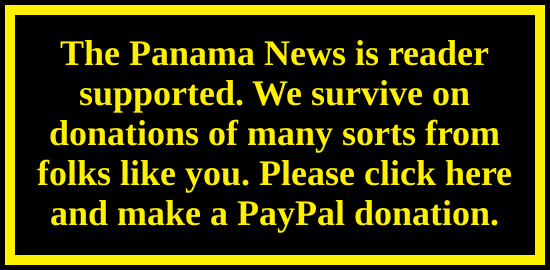Got a month to decide. Archive photo from the 2014 election by Eric Jackson.
Left and right in the elections
by Marco Gandásegui, hijo
It’s a month before the Panamanian citizenry goes to the polls to choose a new president and some 850 other elected officials. The campaign season officially opened a month ago and only four of the seven candidates have presented platforms on which they say they would govern.
Only the candidate of the Broad Front for Democracy (FAD), Saúl Méndez, is armed with a plan to confront the social and economic crisis cause by the neoliberal policies of the past 30 years. Ana Matilde Gómez, an independent candidate, has a program that her supporters call minimum. For his part the PRD’s Laurentino Cortizo offers a platform that rests on four pillars without greater pretensions. The candidate of the ruling Panameñnista party, José Blandón, distances himself from the current president but does not define his objectives.
In their propaganda and in the debates they don’t propose structural solutions to poverty, inequality of informal employment. They don’t talk about the creation of jobs in the industrial or agricultural sector by way of an investment plan.
They all say that they want to be part of the plans that China has for Panama. But they forget that they are the ones who have to propose the plans. They all talk about a “bullet train” – which looks like it’s going to be a turtle train – but the candidates don’t know for what it’s supposed to serve.
A century ago the “founding fathers” confessed that they didn’t know what sort of republic they were creating and what the United States intended with its canal construction. They had other priorities. Likewise, 200 years ago those who called Simón Bolívar The Liberator did not know of the Colombian project. Mariano Arosemena and his partners had dreams of a commercial emporium. They were only dreams.
Like the Liberals of the 1950s and 1960s, the rightist candidates promise to resolve the problems of water, of garbage collection, of education, of health and to meet other popular demands. But none of them propose a working plan that would contribute to the solusion of these problems. They are asking for our votes and at the same time saying that we will have five more year of frustration. Corruption and unsafe communities will remain the same.
What the Panamanian feels the most is the lack of job opportunities and of social security. In 2005 they privatized Social Security, creating a mixed public-private system of individual accounts. The workers within a decade began to feel mocked when they didn’t receive their pensions. The candidates talk of more reforms to Seguro Social. What should be proposed is a solidary system that guarantees the payment of pensions when the worker retires.
In the debate a breach has opened up between the so-called political left and its counterpart the political right. We should be clear what these two sides represent. The left is a position that fights to make changes. On the other hand, the right wants to conserve all of the existing values and institutions.
The use of these terms arose in the French Revolution of 1789, when a national assembly was convened to draft a constitution. The partisand of the republic and of the deepening revolutionary process sat on the left. Those who supported the monarchy and the king of that time sat on the right.
Since then, for nearly 250 years, those who fight for change are called leftists. Those who uphold the established order are the right. Nowadays those who defend neoliberal policies that impoverish workers, farmers and indigenous people are the right. Those who want to do away with neoliberal policies and regulate the economy – put it at the service of the public well-being – are the left.
Who are the good guys and who are the bad guys? The answer is simple: it depends on which side you are on. If you support the oligarchs of the right, your enemy is the people. If, on the contrary, you support the people who want changes – the left – your foe is the oligarchy.
In this 2019 electoral contest the right – three candidates of neoliberal parties and three independents – propose to resolve our problems without altering the neoliberal economic model. That is, to deregulate the economy so that rentiers and speculators can continue to concentrate their wealth. The left, on the other hand, wants changes, beginning with the economic model and continuing to guarantee the security of the things that most matter to the population.
These links are interactive — click on the boxes












